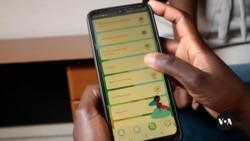ລັດຖະບານເຄັນຢາ ກໍາລັງໃຊ້ແອັບພລິເຄຊັນມືຖືໃຫມ່ແອັບນຶ່ງ ເພື່ອໃຫ້ ຄວາມຮູ້ແກ່ບັນດາເດັກຍິງ ກ່ຽວກັບສຸຂະພາບປະຈໍາເດືອນ. ໂດຍຜ່ານແອັບ ໂອເຄ ເຄັນຢາ (Oky Kenya), ຜູ້ໃຊ້ສາມາດເຂົ້າເຖິງຂໍ້ມູນກ່ຽວກັບສຸຂະນາໄມ ແລະຫົວຂໍ້ອື່ນໆ. ເປົ້າໝາຍກໍ ແມ່ນເພື່ອຈັດການກັບຄວາມເຊື່ອຜິດໆ ແລະຄວາມເຂົ້າໃຈຜິດໆ ກ່ຽວກັບການມີປະຈຳ ເດືອນ ແລະປົກປ້ອງເດັກຍິງຈາກການຖືພາໃນໄວໜຸ່ມ. ວິກຕໍເຣຍ ອາມຸງກາ (Victoria Amunga) ລາຍງານຈາກໄນໂຣບີ.
ຢູ່ທີ່ສູນບໍລິການສຸຂະພາບທາງໂທລະສັບ LVCT ຂອງ ເຄັນຢາ ໃນ ນະຄອນຫຼວງ ໄນໂຣບີ (Nairobi) ບັນດາພະນັກງານ ຈະຕອບໂທລະສັບ ແລະຂໍ້ຄວາມຈາກທົ່ວປະເທດ. ພວກເຂົາເຈົ້າ ກ່າວວ່າຄໍາຖາມສ່ວນໃຫຍ່ແມ່ນກ່ຽວກັບສຸຂະພາບຈະເລີນພັນ, ໂດຍສະ ເພາະຮອບປະຈໍາເດືອນ.
ການມີປະຈໍາເດືອນ ມັກຈະຖືກປົກປິດໄວ້ເປັນຄວາມລັບ ແລະເປັນເລື້ອງໜ້າອັບອາຍ ໃນປະເທດ ເຄັນຢາ, ອີງຕາມຂໍ້ມູນຂອງອົງການ UNICEF. ອົງການດັ່ງກ່າວກ່າວວ່າ ເດັກຍິງໄວໜຸ່ມ ມັກຈະຊອກຫາຂໍ້ມູນກ່ຽວກັບເລື້ອງນີ້ທາງອອນໄລນ໌, ແຕ່ສິ່ງທີ່ພວກ ເຂົາຄົ້ນພົບນັ້ນ ແມ່ນບໍ່ຖືກຕ້ອງສະເໝີໄປ.
ເພື່ອຊ່ວຍພວກເຂົາ, ລັດຖະບານເຄັນຢາ, ອົງການ UNICEF ແລະ ສູນສຸຂະພາບ LVCT ໄດ້ສ້າງ ໂອເຄ ເຄັນຢາ (Oky Kenya), ແອັບມືຖືທີ່ອະນຸຍາດໃຫ້ເດັກຍິງ ໄວໜຸ່ມໄດ້ຮຽນຮູ້ກ່ຽວກັບຮ່າງກາຍຂອງພວກເຂົາເອງ ແບບເປັນການສ່ວນຕົວ.
ທີ່ປຶກສາດ້ານສຸຂະພາບຂອງ LVCT, ທ່ານນາງ ເຄທ ໂອກູຕູ (Kate Ogutu) ເຊິ່ງເປັນຫົວໜ້າພະແນກແອັບພລີເຄຊັ້ນ Oky Kenya, ກ່າວວ່າ:
“ມັນບອກວ່າ ພວກເຂົາວ່າ ປະຈຳເດືອນຂອງພວກເຈົ້າກຳລັງຈະມາ, ນັ້ນເປັນເລື່ອງປົກກະຕິ. ມັນບໍ່ແມ່ນສິ່ງໜ້າອັບອາຍ. ພວກເຂົາເຈົ້າຈະສາມາດຮູ້ວ່າ ພວກເຂົາສາມາດຫາຊື້ ຜະລິດຕະພັນນີ້ທີ່ພວກເຂົາຕ້ອງການໄດ້ຢູ່ໃສ. ນອກຈາກນີ້ ຍັງເປັນການສະຫນັບສະ ຫນູນທາງດ້ານຈິດໃຈ, ເນື່ອງຈາກບາງຄົນບໍ່ຮູ້ວ່າເປັນຫຍັງພວກເຂົາເຈົ້າ ຈຶ່ງມີປະຈໍາ ເດືອນ. ເຂົາເຈົ້າສົງໄສວ່າ ‘ເປັນຫຍັງຂ້ອຍຈຶ່ງໄດ້ມີເລືອດອອກ?’’
ນາງ ຊີຊີເລຍ ໂລກູ (Cicilia Loku) ແມ່ນຫນຶ່ງໃນຫຼາຍກວ່າ 8,000 ຄົນທີ່ໃຊ້ແອັບພລີ ເຄຊັນນີ້. ນາງ ໂລກູ (Loku) ເຊິ່ງແມ່ນແມ່ລູກຫນຶ່ງ ໄດ້ກ່າວວ່າການຖືພາໃນໄວຫນຸ່ມ ຂອງນາງແມ່ນສາມາດຫຼີກລ້ຽງໄດ້ ຖ້ານາງໄດ້ຮັບຂໍ້ມູນທີ່ມີຢູ່ໃນແອັບດັ່ງກ່າວ, ໂດຍນາງ ໄດ້ກ່າວວ່າ:
"ຖ້າຂ້ອຍມີຂໍ້ມູນ ຄືຶແອັບນີ້ທີ່ສາມາດຄາດຄະເນຮອບປະຈຳເດືອນຂອງຂ້ອຍ, ມື້ທີ່ປອດ ໄພຂອງຂ້ອຍ, ໃນເວລາທີ່ຂ້ອຍໄຂ່ຕົກ. ຂ້ອຍຈະບໍ່ຖືພາ, ຂ້ອຍຄົງຈະບໍ່ເປັນແມ່ໃນຕອນນີ້."
ອີງຕາມອົງການດູແລສຸຂະພາບຫຼາຍບ່ອນໃນທົ່ວໂລກ, ການລະເວັ້ນຈາກທຸກຮູບແບບຂອງກິດຈະກໍາທາງເພດ - ເປັນວິທີດຽວທີ່ມີປະສິດທິຜົນ 100 ເປີເຊັນ ເພື່ອຫຼີກລ້ຽງການຖືພາ. ຮູບແບບການຄຸມກຳເນີດຕ່າງໆ ເຊັ່ນ: ການໃຊ້ຢາຄຸມກຳເນີດ ຫຼື ຖົງຢາງອະນາໄມ, ຍັງຊ່ວຍຫຼຸດໂອກາດໃນການຖືພາໄດ້ຢ່າງຫຼວງຫຼາຍ.
ຜູ້ໃຊ້ແອັບ ໂອເຄ ເຄັນຢາ (Oky Kenya) ບໍ່ພຽງແຕ່ສາມາດຕິດຕາມຮອບປະຈໍາເດືອນ ຂອງພວກເຂົາເຈົ້າຢູ່ໃນ ແອັບ ໄດ້, ແຕ່ຍັງສາມາດສົ່ງຂໍ້ຄວາມ ຫຼືໂທຫາທີ່ປຶກສາ ແລະ ຮຽນຮູ້ກ່ຽວກັບສິດທິດ້ານສຸຂະພາບຈະເລີນພັນໄດ້ອີກດ້ວຍ.
ທ່ານນາງ ເຄທ ຄີອາມາ (Kate Kiama) ເປັນຜູ້ອໍານວຍການໂຄງການ ແລະຜົນກະທົບ ຢູ່ທີ່ອົງການ She's The First, ເຊິ່ງເປັນອົງການທີ່ໃຫ້ການສະຫນັບສະຫນູນເດັກຍິງ ໃນສະຫະລັດ ທີ່ເຮັດວຽກຢູ່ໃນ ເຄັນຢາ ແລະສະຫນັບສະຫນູນ ແອັບນີ້. ນາງກ່າວວ່າ ນະວັດຕະກໍາໃໝ່ເຊັ່ນ: ແອັບພລີເຄຊັ້ນ ເປັນສິ່ງຈໍາເປັນໃນສັງຄົມ ທີ່ຫລີກລ້ຽງຈາກ ການສົນທະນາທາງເພດ ແລະສຸຂະພາບຈະເລີນພັນ, ໂດຍທ່ານນາງ ໄດ້ກ່າວວ່າ:
''ຜູ້ໃຫ້ຄຳປຶກສາ ມັກຈະອາຍທີ່ຈະໂອລົ້ມກັບເດັກຍິງ ກ່ຽວກັບການກາຍເປັນຜູ້ໃຫຍ່, ບໍ່ວ່າຈະເປັນສຸຂະອະນາໄມປະຈໍາເດືອນ. ທ່ານຄົງຈະສາມາດຈິນຕະນາການໄດ້ເຖິງ ຍິງສາວທີ່ມາຈາກຊຸມຊົນທີ່ຄິດວ່າການເປັນປະຈຳເດືອນ ແມ່ນເລື້ອງຕ້ອງຫ້າມອັນນຶ່ງ, ເດັກຍິງຄົນນີ້ບໍ່ມີໃຜ ອະທິບາຍໃຫ້ລາວຟັງໄດ້ເລຍວ່າ ນີ້ແມ່ນຂະບວນການທາງຊີວະ ພາບຕາມທໍາມະຊາດ.
ກະຊວງສາທາລະນະສຸກ ລະບຸວ່າ ເດັກຍິງໄວໜຸ່ມ ໂດຍສະເລ່ຍສີ່ໃນສິບຄົນ ໃນ ເຄັນຢາ ກຳລັງຖືພາ ຫຼືມີລູກ.
ໃນການໃຫ້ສໍາພາດທາງໂທລະສັບ, ທ່ານ ນາງ ເຈເນັດ ມູເລ (Janet Mule), ຮອງຫົວຫນ້າກົມ ຢູ່ກະຊວງດັ່ງກ່າວ ເວົ້າວ່າຄວາມທຸກຍາກ ແລະການຂາດການສຶກສາ, ໂດຍສະເພາະໃນເຂດຫ່າງໄກສອກຫຼີກ ເຮັດໃຫ້ກໍລະນີນີ້ ຮຸນແຮງຂຶ້ນ.
ລັດ ໄດ້ສ້າງຕັ້ງນະໂຍບາຍສຸຂະພາບຈະເລີນພັນ ໄລຍະ 10 ປີ ຂຶ້ນໃນປີ 2022 ໂດຍໄດ້ກໍານົດການດຳເນີນການເພື່ອຫຼຸດຜ່ອນການຖືພາຂອງໄວໜຸ່ມ, ເຊັ່ນ: ການສົ່ງ ເສີມຄວາມຮູ້ກ່ຽວກັບຮອບປະຈໍາເດືອນ ແລະການນໍາໃຊ້ການຄຸມກໍາເນີດ.
ອໍານາດການປົກຄອງຂອງເຄັນຢາເຊື່ອວ່າ ເຄື່ອງມືເຊັ່ນ: ແອັບ ໂອເຄ ເຄັນຢາ (Oky Kenya App) ຈະຊ່ວຍໃຫ້ເດັກຍິງໄວໜຸ່ມ ໄດ້ຮັບຂໍ້ມູນທີ່ຖືກຕ້ອງ.
ອ່ານລາຍງາເປັນພາສາອັງກິດລຸ່ມນີ້:
The Kenyan government is using a new mobile application to educate girls about menstrual health. Through the Oky Kenya app, users can access information on hygiene and other topics. The goal is to dispel myths and misconceptions about menstruation and protect girls against teenage pregnancies. Victoria Amunga reports from Nairobi.
At Kenya's LVCT Health call center in Nairobi workers respond to phone calls and text messages from across the country. They say most of the questions are about reproductive health, especially the menstrual cycle.
Menstruation is often shrouded in secrecy and shame in Kenya, according to UNICEF. The agency says teenage girls often look for information about it online, but what they find is not always accurate.
To help them, the Kenyan government, UNICEF and LVCT Health created Oky Kenya, a mobile app that allows teenage girls to learn about their bodies in private.
LVCT Health counselor Kate Ogutu heads the Oky Kenya App desk.
Kate Ogutu, Health Counselor:
“It tells them having your periods, that is a normal thing. It's not something to be ashamed of. // They will be able to know where they can get this product that they need. Also support mentally, cause some people don't know why they are having periods. They wonder, ‘Why am I receiving blood?'’'
Cicilia Loku is one of more than 8,000 people using the application. Loku, a mother of one, says her teenage pregnancy could have been avoided if she had received the information available on the app.
Cicilia Loku, Oky Kenya App User:
"If I had that information like this app can predict my periods, my safe days, when I am ovulating. I wouldn't be pregnant, I wouldn't be a mother right now.''
According to several health care organizations worldwide, abstinence — refraining from all forms of sexual activity — is the only 100% effective way to avoid pregnancy. Various forms of contraception, such as using birth control pills or condoms, also greatly reduce the odds of conception.
Oky Kenya users can not only track their menstrual cycles on the app but also text or call mentors and learn about reproductive health rights.
Kate Kiama is director of programs and impact at She's The First, a U.S.-based girls support organization that works in Kenya and supports the app. She says innovation such as the app is needed in a society that shies away from discussing sexual and reproductive health.
Kate Kiama, Director at She's the First:
''Mentors are particularly shy to talk to girls about whether it’s puberty, whether it's about menstrual hygiene. // You can imagine a girl who comes from a community who thinks periods [are] such a taboo, this girl doesn't have anyone to explain to her this is natural biological process.''
An average four in ten teenage girls in Kenya are pregnant or have had a child, according to the Ministry of Health.
In a telephone interview, the ministry's deputy head, Janet Mule, said poverty and lack of education, especially in remote areas, aggravate the cases.
The state established a 10-year reproductive health policy in 2022 that outlines actions to reduce teenage pregnancies, such as promoting knowledge about the menstrual cycle and the use of contraception.
Kenyan authorities believe tools like the Oky Kenya App will help teenage girls get the information they need.







ຟໍຣັມສະແດງຄວາມຄິດເຫັນ